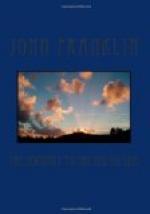We embarked at five A.M. and proceeded towards the sea which is about nine miles beyond the Bloody Fall. After passing a few rapids the river became wider and more navigable for canoes, flowing between banks of alluvial sand. We encamped at ten on the western bank at its junction with the sea. The river is here about a mile wide but very shallow, being barred nearly across by sandbanks which run out from the mainland on each side to a low alluvial island that lies in the centre and forms two channels, of these the westernmost only is navigable even for canoes, the other being obstructed by a stony bar. The islands to seaward are high and numerous and fill the horizon in many points of the compass; the only open space seen from an eminence near the encampment being from North by East to North-East by North. Towards the east the land was like a chain of islands, the ice apparently surrounding them in a compact body, leaving a channel between its edge and the main of about three miles. The water in this channel was of a clear green colour and decidedly salt. Mr. Hearne could have tasted it only at the mouth of the river, when he pronounced it merely brackish. A rise and fall of four inches in the water was observed. The shore is strewed with a considerable quantity of drift timber, principally of the Populus balsamifera, but none of it of great size. We also picked up some decayed wood far out of the reach of the water. A few stunted willows were growing near the encampment. Some ducks, gulls, and partridges were seen this day. As I had to make up despatches for England to be sent by Mr. Wentzel the nets were set in the interim and we were rejoiced to find that they produced sufficient fish for the party. Those caught were the Copper-Mine River salmon, white-fish, and two species of pleuronectes. We felt a considerable change of temperature on reaching the sea-coast, produced by the winds changing from the southward to the North-West. Our Canadian voyagers complained much of the cold but they were amused with their first view of the sea and particularly with the sight of the seals that were swimming about near the entrance of the river, but these sensations gave place to despondency before the evening had elapsed. They were terrified at the idea of a voyage through an icy sea in bark canoes. They speculated on the length of the journey, the roughness of the waves, the uncertainty of provisions, the exposure to cold where we could expect no fuel, and the prospect of having to traverse the barren grounds to get to some establishment. The two interpreters expressed their apprehensions with the least disguise and again urgently applied to be discharged, but only one of the Canadians made a similar request. Judging that the constant occupation of their time as soon as we were enabled to commence the voyage would prevent them from conjuring up so many causes of fear, and that familiarity with the scenes on the coast would in a short time enable them to give scope to their natural cheerfulness, the officers endeavoured to ridicule their fears and happily succeeded for the present. The manner in which our faithful Hepburn viewed the element to which he had been so long accustomed contributed not a little to make them ashamed of their fears.




